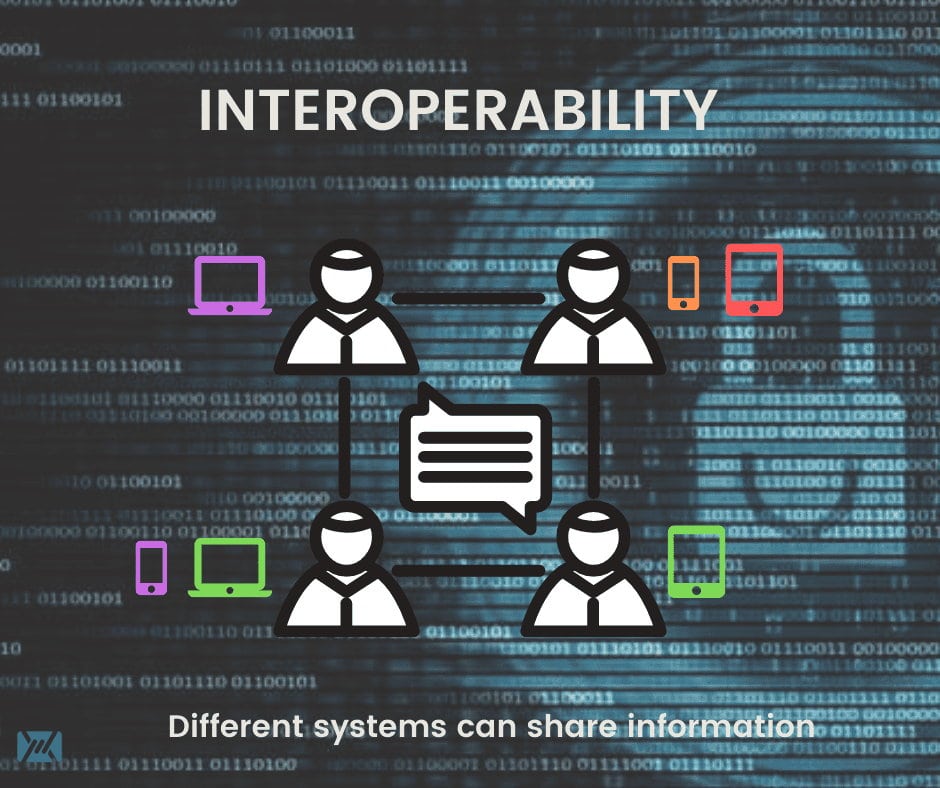In recent years, Western countries have become aware of the growing influence of Internet giants on several aspects of political and economic life. One of the criticisms made against these large internet companies is their lack of interoperability. This notion, although unfamiliar to most Internet users, is nevertheless decisive in many respects. Since it’s a core value of Mailfence, we invite you to discover what interoperability is and how it influences your life.
What is interoperability?
Interoperability is the ability of a system or product to work with other products or systems spontaneously. In other words, it works without requiring any particular action.
Interoperability is based on existing standards and protocols, which are themselves the result of significant innovation. Interoperability allows you to communicate by phone with someone on the other side of the world. It is possible even if your correspondent’s phone network is not the same as yours. It also works if you both use different brands of smartphones with different operating systems (Android and IOS, for example).
Interoperability is also behind the huge success of email. Indeed, email protocol interoperability means that everyone can send and receive messages regardless of the service they choose.

Why is interoperability a key concept?
Interoperability is important because it allows the interconnection of different products and services from different companies. Interoperability gives you technical eclecticism, whether you are a consumer, a small business, or an organization. It expands your range of choice by allowing you to combine a wider and more versatile array of tools fitting your needs.
It also allows creative companies with limited resources to establish themselves on the market with innovative products. Indeed, these companies can rely on existing tools to propose complementary modules without needing to create very elaborate final products requiring a greater technicality.
As a result, interoperability is a decisive factor for innovation and the improvement of the digital ecosystem. One also designed the Internet with interoperability in mind. Standards have been defined so that individuals and organizations around the world could communicate with each other and freely exchange information and services.
What are the benefits of interoperability?
Interoperability can provide several benefits to the companies that adopt it, such as:
- Being better able to quickly and automatically gather information and share it with relevant parties
- Improving their productivity as the necessary data is available and accessible to any relevant party in the system (no gatekeepers)
- Interoperability also improves data protection as there’s no need to enter personal information every time you request shared records
- Decreases errors and the chance of outdated or duplicated data thanks to a connected information system
- Requires fewer resources than non-interoperable systems and thus also lowers costs
Who are the gatekeepers?
Unfortunately, some companies seek to undermine this openness by creating walled gardens. They maintain closed ecosystems in which they control the hardware, the applications, or the content. As a result, their users are limited to the services, content and communications provided within these platforms.
These firms, known as “gatekeepers”, use strategies to block other companies from accessing their user base. They may charge their users high fees, rank them less favourably in their search engine results, and control their reputation. These gatekeepers are nothing else than digital behemoths. They include the GAMAF (Google, Amazon, Microsoft, Apple and Facebook), but also other Internet giants with huge user bases such as Uber, Twitter and TikTok.
Thus, the owner of an iPhone can only download the applications offered in the Apple App Store. They will not be able to install an application found in Google Play on their phone. A WhatsApp user will not be able to communicate with a Telegram user if this user does not have a WhatsApp account.
Which industries can get the most from interoperability?
Although interoperability can help any industry, the following few can benefit the most from it:
- Health. Interoperability can help healthcare systems better manage their patient’s information from their medical history to billing information. This is true even if they come from a different healthcare system (other country)
- Software. It can remove barriers caused by different programming languages and help software companies more easily receive and share data
- Government. Interoperability can also help government organizations communicate more effectively between each others, regardless of things like system compatibility or language barriers
What is the network effect?
In a normal situation, any new company can succeed in a given market, even if it is a niche with a very limited number of companies. However, in the digital market, this is no longer always the case, due to scale effects and network effects.
To get the lion’s share of the market, large internet companies provide many services “for free”, or at rock-bottom prices to build gigantic user bases.
Each new user strengthens the attractiveness of the platform because it extends the number of users one can interact with such as with Facebook. Moreover, by diversifying the platform’s content, it allows the algorithms to refine their selections to offer more relevant content to all users such as in the case of a search engine such as Google. Finally, a larger user base encourages the development of new applications such as on the app stores of Android and iPhone.
This virtuous circle for platforms is called the “network effect”.
In this situation, users are reluctant to switch service providers or platforms, as it makes them lose access to the advantages of the network effect.
Also, the lack of interoperability of some gatekeepers forces users to signup to these platforms because they have a large user base which makes them unavoidable. They feel forced to join them in order to interact with a larger number of people.
Thus, the dominance of these behemoths grows stronger with each new user they sign up. Over time, their power dissuades other players from creating competing services because they know they’ll never attract enough users to make a potential new service attractive and profitable.
The network effect is so effective that even a powerful company can fail to penetrate a market where another player already holds this benefit. Google+ never succeeded in competing with Facebook, and Google had to throw in the towel. Microsoft’s Bing never managed to catch up with Google Search. This hurdle is even greater for start-ups looking to enter these markets. Signal, an end-to-end encrypted instant messaging service, is struggling to gain a foothold because of WhatsApp’s dominance, even though its service offers more value to users than WhatsApp.
Internet users held hostage
As a consequence, the dominant platforms find themselves in a monopoly situation in a market devoid of competition. In this position, it can be tempting to maintain the status quo and not spend any more money on innovation.
Very often, they prefer to consolidate their dominant position or conquer new markets close to the markets they dominate by using the knowledge they have gathered about their users. Therefore, they succeed in gaining a foothold in new markets, even when long-established players held them.
Users are then held hostage with a service that barely evolves, with no option to switch to another. At that point, there is no more obligation for the monopoly to keep prices low or free. Their status as a must-have service allows them to freely fix their prices.
Monopoly or duopoly status is already a given for many major Internet services. In 2019, a UK government study has estimated that the largest or the two largest players in the mobile operating system and online search market took nearly 100% of the UK market share. The share of the two largest social media companies was over 90%.
One has thus been stealthily modifying the digital landscape. A decade ago, it was common to have an account with at least a dozen different social media. Today, most users of these platforms have only two or three accounts.
Regulators target interoperability
The dominance of the gatekeepers and the pernicious effects it has on the digital marketplace, public order and political life is increasingly alarming regulators in Europe, the United States and elsewhere.
A company that dominates its market, thanks to network effects, has no interest in promoting interoperability, and it does not do so spontaneously.
Government intervention is, therefore, necessary to restore the conditions that will encourage the emergence of competing firms.
Western countries have clearly grasped it. That’s why the European Commission is promoting seamless services and data flows for European public administrations. In December 2020, the EU presented 2 texts, the “Digital Services Act” (DSA) and the “Digital Markets Act” (DMA), which should come into force in 2022. The DSA targets content published on platforms, while the DMA aims to regulate competition on the Internet.
A key concern for Mailfence
Interoperability is one of Mailfence’s core values. It was a determining factor in the design of our solution. Mailfence is designed with built-in interoperability so that our users can integrate our service with their favorite tools, without compromising their performance or the scope of their features.
Mailfence email is fully interoperable with any other encrypted email service in the world based on OpenPGP, one of the most widely used email encryption protocols. This ensures a standardized and interoperable competitive environment. The files and keys generated in the program are compatible with all software that supports this standard. It is indeed crucial to insure protection even for the data shared through interoperability, as it’s always been a priority for us.
Mailfence also gives its users full control over their key management and offers complete reversibility. Any user can export their keys and data to any other platform whenever they want.
Mailfence has joined the Coalition for Competitive Digital Markets. The #C4DM is fighting for the Digital Markets Act to impose stricter rules on pre-installed applications, bundling and interoperability (discover our open letter to European regulators here).
Last year, as a member of the Digital SME Alliance in Europe, we already urged MEPs to include ex-ante interoperability requirements for major players in digital services markets benefiting from significant network effects in the next draft law on digital services.
In conclusion, interoperability is a necessary condition to obtain healthy competition, based on the benefits brought to the users, rather than on the size of the provider’s customer base. As such, it provides freedom for Internet users by giving them the power to choose the services they prefer according to their own criteria. It enables the entry of new players on the market and the rise of more innovative, creative and cheaper solutions for the common good.
Stay up to date with our latest articles by following us on Twitter and Reddit. For more information on Mailfence’s secure email suite, please do not hesitate to contact us at support@mailfence.com.




